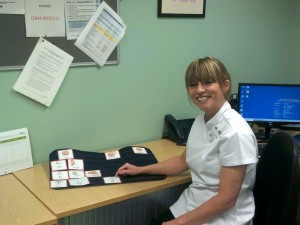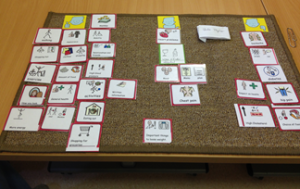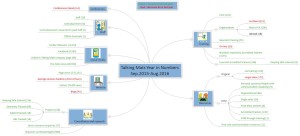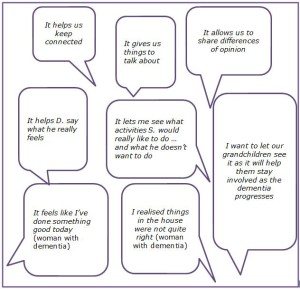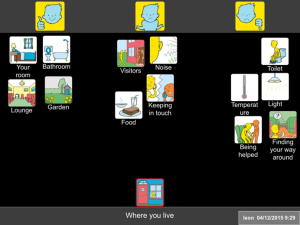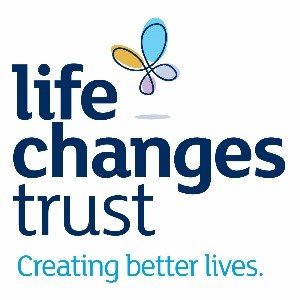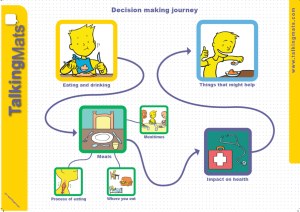Thanks to Gill Pearl for sending us this information about an international conference for people with aphasia.
Where: Warwick Conference Centre, Coventry, England
When: Sunday 5 and Monday 6 March, 2017
Families, friends, aphasia and stroke organisations, and health professionals are also invited. People with aphasia have planned the conference and will chair the sessions.
The information will be presented in a way that is easier for people with aphasia. There will be support from therapists and students to help people to join in.
The following themes will be discussed
- technology and aphasia, learn and have a go
- increasing awareness of aphasia, and using social media
- sharing what’s happening about aphasia around the world
- research
- support for carers of people with aphasia
- aphasia and the arts.
There will be an exhibition of products relevant for people living with aphasia
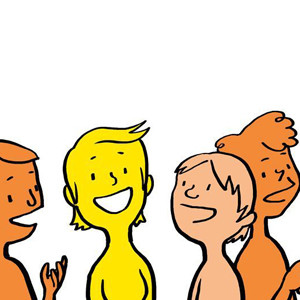
- Do something new, develop confidence, be inspired
- Learn from each other and share ideas
- Find out about new services and ways to help
- Meet people with aphasia from around the world!
If you want to find out more, contact Gill or Denise at
- info@buryspeakeasy.org.uk
- gill@buryspeakeasy.org.uk
- 01706 825802 (part time office)
Many thanks to Cheryl Strutt for this lovely blog about how she developed and used an Aromatherapy Talking Mat with people with learning disability.
I am an Aromatherapist who works with adults who have a learning disability and often additional communication difficulties. As part of a recent service review I wanted to develop patient involvement. Talking Mats (TM) was suggested as a possible option to support patient feedback. I decided to look into this tool further and access training. During my TMs training I was supported to develop my specific Aromatherapy TM. The main aim behind this initiative was to adopt a system that could identify how each patient felt about the service and identify if there were areas where changes or improvements could be made. I wanted to work closely, alongside each patient, in order to learn how they really felt about their Aromatherapy treatments, their likes/dislikes etc. and to give them a sense of ownership of their sessions. It’s all about giving individuals with a communication difficulty a voice that can be heard.
The Aromatherapy TM supported patients to understand what is involved in an aromatherapy session and has been effective in helping them to personalise their session.
I used the Aromatherapy TM within the patient’s first session and following their last session, taking a photograph of the completed mats as evidence. The TM is an excellent way of offering a range of different types of massage experience and the patient can select their preferences. I found it an excellent way, to obtain valuable feedback on patient experience. One patient with a severe learning disability and autism was able through the use of symbols, to indicate his dislike for the music being played during his Aromatherapy session. He has no verbal means of communication and feedback like this would not have been achieved if the Aromatherapy TM wasn’t used. Through the implementation of the TM I now have evidence of patient centred practice, in relation to the therapeutic value of the Aromatherapy Service. The Aromatherapy TM supported patients to understand what is involved in an aromatherapy session and has been effective in helping them to personalise their session.
Since the implementation of the Aromatherapy TM, patient feedback is now at the heart of the Service. The patient is now able to openly give comments, make choices on their treatment plan, which in turn is making their attendance at the department, a very pleasurable one and it’s very personal to the individual. Another patient who said that he wasn’t able to read or write, was able to explain what the symbols meant and chose the symbol for happy. He went on to indicate his preferences stating ‘I like foot-spa and a foot massage.’ Prior to using the TMs, I was often reliant on observing the patient’s body language to assess their level of enjoyment and gain feedback. The Aromatherapy TM now allows for a more accurate method of evaluating interventions. I am so enthusiastic about the increased level of patient involvement and the willingness of the patients to become involved in this activity. This project clearly demonstrates the value of involvement, leading to improved partnership working and better experiences.
Cheryl Strutt, Aromatherapist, Cheryl.strutt@belfasttrust.hscni.net
Many thanks to Shirley Rush Health Facilitator at Belfast Health and Social Care Trust for this great blog about using TM as a ‘weigh to health’.
Following my Talking Mats (TM) training I had the opportunity, as a health facilitator, to use TM in an adapted ‘Weigh to Health’ course. This course encouraged people with learning disabilities to make small changes to their lifestyle and to educate them on the effects of obesity and their health.
Prior to commencing the group work we met with each person and completed a Talking Mat. The topic was to explore “Important things to lose weight”, we used a wide range of symbols and included physical activity, health conditions and appearance. Clients also requested additional symbols were added including alcohol, cycling and mood, which made the mat individual to them.
A photograph was taken of the completed TM to act as a record of what was important to them. On completion of the group the TM was repeated with each person using the same topic and symbols and the mat was again photographed. When we compared the TMs it showed that all the client’s knowledge and understanding of the effects of obesity and the health benefits associated with weight loss had increased.
“it done me good, helped me to lose weight by talking about my health and the need to lose weight to look after my heart”
The use of the talking mat was a valuable resource, it allowed each client to make an informed choice about participating in the group work. One client said he felt he had been listened too and “it done me good, helped me to lose weight by talking about my health and the need to lose weight to look after my heart”. By using TM in this way we have been able to use this information to demonstrate outcomes and it shows the information was presented at a level of understanding suitable for the client group. On an easy read questionnaire about the course all the clients agreed that doing the TM was useful, one person wrote “loved doing the mat”.
If you want to get more information from Shirley contact her at Shirley.rush@belfasttrust.hscni.ne
Talking Mat would like to wish you all a Happy Christmas
2106 has certainly been a busy year for us at Talking Mats. We have seen some staff changes saying goodbye to Jill hall and welcoming Morag Crawford. We were delighted when we brought Kirsty onto our staff . Kirsty originally volunteered with us as part of a school transition programme for people with autism. Laura Holmes joined us as a Talking Mats external associate for the North West of England.
If you are interested in what we do and want to see our activity in numbers then have a look at the Talking Mats Year in numbers . Click on image to see the enlarge !
At the moment we are busy preparing for 2017 and we are looking forward to
- The evaluation of our following projects in The New Year
- The National Involvement Network on our partnership with ARC Scotland
- Our programme of service wide training with Central London Community health
2 Continuing to work with
- Patient Opinion
- The Alliance Self-management digital project
- Colleagues in Germany
3 Launching more resources
- Keeping Safe- so far this resource has only been available to people working with people with learning disability in Scotland. We will be holding a specialist seminar about this resource in London on the 17th March so its use can extend south of the border .
- Launching our conversation sets: gardens, holidays, trips out, sports indoor, sports outdoor and football. These were developed as part of the family training for people with dementia but they have much wider use and will be available as additional Talking mats sets
Plus Talking Mat is planning to go to Australia in May!
Nicki and Lois have their flights booked. Agosci here we come ! Then we are over to New Zealand to run foundation training in Christchurch and Auckland before we head back to Melbourne to run the first ever accredited training course in Australia. We will also be running a specialist seminar on Keeping Safe in Melbourne. If you want any details about the trip please get in touch.
We really appreciate all the support we get from everyone involved in Talking Mats and wish you all a happy and peaceful festive season
This blog summarises a project we have completed providing Talking Mats training for families living with dementia. A key aspect of the work done by Talking Mats is to find ways to improve communication for families living with long term conditions. In particular dementia is a long term condition where deterioration in communication will eventually affect everyone. This makes it increasingly difficult to ensure that the person with dementia continues to be involved in decisions about their life.
We have completed a project funded by Health and Social Care ALLIANCE Scotland. Training in the use of Talking Mats was given to families living with dementia and staff who worked with these families. The Alliance Family Training final report highlights how this training helped people with dementia to communicate their views and be more involved in making decisions about their lives.
Families identified issues relating to self-management that they had not previously been aware of and new insights emerged as the following comments illustrate.(click on box to enlarge)
For some family members an important outcome was that Talking Mats helped them see that their spouse was satisfied with many aspects of his/her life. They found this very reassuring as many assumed that the person with dementia was frustrated and discontented.
The following is an example of how using Talking Mats helped with self-management.
When using Talking Mats on the topic of Where you live, G explained that he found it difficult to find his way to the toilet in the night. As a result his wife bought special senior night lights to help him which solved their problem. As a result, night times improved for both of them.
For further examples and information read the full report here Alliance Family Training final report and for further information about Talking Mats Family training please contact info@talkingmats.com
We are delighted to have received funding from Life Changes Trust to work with Patient Opinion to help improve the access to their website by developing a Talking Mats to enable people to tell their stories.
Like Talking Mats, Patient Opinion is a Social Enterprise and has an excellent independent website https://www.patientopinion.org.uk/ that enables people to share their experiences of UK health services, good or bad. They then pass the stories to the right people so that they can learn from them.
The project we are working on is focusing on people with dementia but in the long run we hope that lots of people will benefit. It will bring our two innovative technologies together marrying the expertise of the Patient Opinion website with that of the Digital Talking Mats.
Our aim is that people affected by dementia can use their own voice to share their experiences and make real differences to relationships, services and culture, just as many others are already doing across health and care. We also hope that this work will empower others with communication or cognitive difficulties to share their experiences and be heard in an open and transparent way.
This ground breaking work is being funded and supported by Life Changes Trust, People Affected by Dementia programme. The Big Lottery funded programme is committed to working with people living with dementia and those who care for them, investing resources so that individuals are more able to face the challenges before them, and can exercise more choice and control in their own lives.
We expect the project to take 18 months to complete and have already run focus groups with people with dementia, family members and expert practitioners to plan the new symbols. We are now working with the technical experts to create the website interface which we will then pilot with people with dementia.
Watch this space for more updates…..
It is important that we ask people with learning disability about their lives and enable them to raise any concerns. Over the past couple of years we have been developing a Talking Mat called Keeping Safe. It is a resource that gives people time to think about various aspects of their lives, and express how it is going for them.
234 staff in different parts of Scotland now have the resource and have been trained to use it. Feedback includes that using the Keeping Safe resource can improve the quality of communication for both the person with a learning disability and the staff member in the following ways :
- Staff frequently commented that using the Mats revealed things they had not known previously;
‘It gave so much information which we did not expect. It will assist in Adult Support and Protection feedback. It gave him his own say in things.’
‘allowed needs to be identified that I would not have thought to ask about, such as the smoking and taking drugs.’
- It enabled staff have a conversation about more sensitive and or difficult issues;
‘Usually when she expresses her feelings she can get either upset or angry. She did not get upset or angry at any point through doing the Talking Mats, although the subject and things she was saying was at times difficult issues.’
‘A has good communication skills but as we had a sensitive issue (personal care) to discuss I felt that a talking mat would allow us to explore this.’
- It also helped the thinker ( the thinker is the person doing the mat ) to express their thoughts clearly
‘allowed this person to disclose things that they were struggling to disclose verbally.’
- It helped with memory difficulties and kept the thinker focused on the topic
‘It helps with memory and attention as she has something visual to keep her focused.’
- The information gained reflected the thinker’s view and not the views of those around them
‘This resource gave this gentleman the power to say exactly what he was thinking and not what he thought someone wanted to hear.’
- There was a lot of positive feedback on using the resource from people with learning disabilities
‘I adore this. The mats really helped me speak about my feelings.’
- It was a quick way to get information. Initially many staff thought using the resource would take too much time but in fact were surprised to find how much information they got in a short space of time.
The stories gathered from using the resource are powerful and a final report is being prepared which will be launched at a seminar on the 19th May during learning disability week . There are still some spaces on the seminar so if you would like to attend please contact info@talkingmats.com .
We are delighted that the Scottish Government is funding a further round of Keeping Safe Talking Mats training. If you work with adults with learning disability in Scotland, and would like to apply to a Keeping Safe Talking Mats training course then please email us for dates and the application form.
Following the success of previous seminars we are holding further specialist seminars in Stirling and London for anyone who has done the Talking Mats training. The topics will be:
- Talking Mats and the Eating and Drinking resource (morning)
- Talking Mats and Capacity (afternoon)
During the Eating and Drinking seminar, we provide background on how and why the resource was developed and showed some DVD examples of people using the resource. This really brings things to life and shows how important it is to give people (with and without speech) the opportunity to consider and talk about different aspects of eating and drinking. We also give people hands-on practice in using the symbols from each topic. Each participant will receive a copy of the full Eating and Drinking resource, including symbols, a mat, and explanatory booklet.
During the Capacity seminar we will discuss the fundamental principles of the Capacity Act and participants will have a chance to consider how Talking Mats can help people to:
- understand
- retain/remember
- weigh up information
- communicate their views/wishes and feelings.
They will also be given the opportunity to work through some practical examples and think about options to help people understand issues and make decisions.
If you have completed a Talking Mats training course and would like to attend either of specialist seminars, please click on the relevant course and fill in the registration form.
Stirling on Friday 29th April Stirling Seminars flier Apr 2016
London on Friday 10th June London Seminars flier June 2016
Registration form Seminar registration form 2016

- This tool will be useful in helping some residents make decisions, informed choices and express their needs. It will take time for some residents to feel confident in using this tool.
- I’d like to use it with some residents to be able to adapt Talking Mats more to their understanding.
- I’d like to use this tool for resident’s reviews to find out what the residents likes/dislikes are.
- Talking Mats will be great for service evaluation.
- Talking Mats will be great for asking residents about things they want to do.
- Updating Care Plans regularly from outcomes of Talking Mats.
- It can be used to get to know people’s needs and wishes more.
- Share the findings with colleagues and joint services.
- Hopefully through its use I’ll learn to pass it onto others.
- A gardening set. Service evaluation and well-being assessing stress levels/anxiety/emotional state?
- I’d use it to promote choices of activities.
- Care Inspectorate forms. Finding out how people enjoy time at the service and how to improve on it.
Can you let us know how you use Talking Mats as part of your work?
One of the many ‘non-traditional’ uses of Talking Mats has been the work that has been undertaken with university students (both undergraduate & post graduate) at the University of Stirling. Since 2008, staff in the Career Development Centre at the University have been trained to use Talking Mats as a tool to help students to articulate their career thinking and planning.
We have established from our research and trialling of a range of topic cards that students respond well to the process. While the majority of the students we work with have no speech or language difficulties, the process of TM enables students to articulate their thoughts and to feel more at ease to raise particular issues. It can be very hard for students to talk openly about financial worries, academic issues, or career anxiety. TM gives a platform for this to be done in a non-threatening way and quickly allows the Careers Adviser to see where the student is ‘at’ in their thinking. This then allows the adviser to work more efficiently & effectively to support the student to develop their career plans /strategy.
Staff feedback would indicate that they enjoy working with TM in both one to one and group settings with students. There are many perceived advantages to using TM but one of the main ones is that it can make better use of the time available and that it can be a good way to see quickly where the key issues are that need to be addressed. TM also fits well with current Career Guidance Theory, allowing the student to narrate the ‘story’ and arrive at their own solutions to the ‘problem’ under discussion.
There are of course some students who do have additional learning needs and TM is again an ideal tool. In particular, students with dyslexia and dyspraxia comment positively that the visual aspect of the cards allows them to process the information and structure their thinking in a clearer way that just talking to a careers adviser can.
International students who sometimes have poor English language skills respond well to using TM as it allows us to get a clearer picture of the students thinking than sometimes is the case from a more ‘traditional’ discussion
Action Planning and Goal setting are a big part of the Career Management process and TM is a really useful tool to ‘kick-start’ this process for students. The visual impact is powerful and enables students to see clearly what they are considering and the cards allow the students to physically move the cards to help them to decide how to move forward in their thinking and planning. Students consistently comment that they appreciated the opportunity to see clearly the issues that they are considering and allow them to move forward.
Many thanks to Elaine Watson, Careers Adviser, University of Stirling and one of our accredited trainers for this stimulating description of how she is implementingTalking Mats
 Online training login
Online training login 

